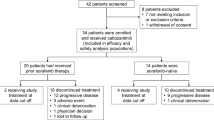Summary
Background Prior to the 2008 advent of sorafenib, traditional cytotoxic agents were the therapeutic mainstay for patients with advanced hepatocellular carcinoma (HCC). We thus undertook a clinical study of sorafinib and conventional cytotoxic therapy for HCC, comparing efficacy and safety. Methods From January, 2002 to December, 2009, 173 patients with unresectable HCC were reviewed retrospectively. Among them, 44 (25.4%) had been treated with sorafenib, and the remainder had received cytotoxic therapy (CTX). We evaluated objective response rate (ORR), progression free survival (PFS), overall survival (OS), and toxicity profiles. Results Median OS of sorafinib was 23.0 weeks (95% CI, 8.1–37.9) vs 43.6 weeks (95% CI, 34.0–53.2) for CTX. Likewise, median PFS was 11.1 weeks (95% CI, 6.5–15.8) vs 12.4 weeks (95% CI, 8.1–16.7) for sorafenib and CTX, respectively. Neither parameter differed significantly (OS, p = 0.105; PFS, p = 0.496). ORR and disease control rate for sorafenib were 2.3% and 52.3% vs 6.2% and 43.4% for CTX. CTX-treated patients experienced more Grade 3/4 neutropenia (19.7% vs 0% for sorafenib), while sorafenib therapy was more often linked to dermatologic toxicities (all grades), such as hand-foot skin reaction, rash, and pruritus. Conclusion Although sorafenib has become the treatment of choice for advanced HCC, there are still unsettled issues regarding the optimal use of sorafenib. Our analysis indicates that conventional CTX can be another option of treatment for advanced HCC. To improve clinical outcomes, further prospective investigations which define the role of CTX are needed.

Similar content being viewed by others
References
Parkin DM et al (2005) Global cancer statistics, 2002. CA Cancer J Clin 55(2):74–108
Lo CM et al (2002) Randomized controlled trial of transarterial lipiodol chemoembolization for unresectable hepatocellular carcinoma. Hepatology 35(5):1164–1171
Llovet JM et al (2002) Arterial embolisation or chemoembolisation versus symptomatic treatment in patients with unresectable hepatocellular carcinoma: a randomised controlled trial. Lancet 359(9319):1734–1739
Llovet JM, Burroughs A, Bruix J (2003) Hepatocellular carcinoma. Lancet 362(9399):1907–1917
Llovet JM, Bru C, Bruix J (1999) Prognosis of hepatocellular carcinoma: the BCLC staging classification. Semin Liver Dis 19(3):329–338
Zhu AX (2006) Systemic therapy of advanced hepatocellular carcinoma: how hopeful should we be? Oncologist 11(7):790–800
Lopez PM, Villanueva A, Llovet JM (2006) Systematic review: evidence-based management of hepatocellular carcinoma–an updated analysis of randomized controlled trials. Aliment Pharmacol Ther 23(11):1535–1547
Simonetti RG et al (1997) Treatment of hepatocellular carcinoma: a systematic review of randomized controlled trials. Ann Oncol 8(2):117–136
Yeo W et al (2005) A randomized phase III study of doxorubicin versus cisplatin/interferon alpha-2b/doxorubicin/fluorouracil (PIAF) combination chemotherapy for unresectable hepatocellular carcinoma. J Natl Cancer Inst 97(20):1532–1538
Wilhelm SM et al (2004) BAY 43-9006 exhibits broad spectrum oral antitumor activity and targets the RAF/MEK/ERK pathway and receptor tyrosine kinases involved in tumor progression and angiogenesis. Cancer Res 64(19):7099–7109
Liu L et al (2006) Sorafenib blocks the RAF/MEK/ERK pathway, inhibits tumor angiogenesis, and induces tumor cell apoptosis in hepatocellular carcinoma model PLC/PRF/5. Cancer Res 66(24):11851–11858
Llovet JM et al (2008) Sorafenib in advanced hepatocellular carcinoma. N Engl J Med 359(4):378–390
Cheng AL et al (2009) Efficacy and safety of sorafenib in patients in the Asia-Pacific region with advanced hepatocellular carcinoma: a phase III randomised, double-blind, placebo-controlled trial. Lancet Oncol 10(1):25–34
Therasse P et al (2000) New guidelines to evaluate the response to treatment in solid tumors. European Organization for Research and Treatment of Cancer, National Cancer Institute of the United States, National Cancer Institute of Canada. J Natl Cancer Inst 92(3):205–216
Llovet JM et al (2008) Design and endpoints of clinical trials in hepatocellular carcinoma. J Natl Cancer Inst 100(10):698–711
Lee HC (2008) Systemic chemotherapy of hepatocellular carcinoma–Korean experience. Oncology 75(Suppl 1):114–118
Qin S et al (2010) Phase III study of oxaliplatin plus 5-fluorouracil/leucovorin (FOLFOX4) versus doxorubicin as palliative systemic chemotherapy in advanced HCC in Asian patients. J Clin Oncol 28(15s):(suppl; abstr 4008)
Yeo W et al (2004) Lamivudine for the prevention of hepatitis B virus reactivation in hepatitis B s-antigen seropositive cancer patients undergoing cytotoxic chemotherapy. J Clin Oncol 22(5):927–934
Leung TW et al (2002) Factors predicting response and survival in 149 patients with unresectable hepatocellular carcinoma treated by combination cisplatin, interferon-alpha, doxorubicin and 5-fluorouracil chemotherapy. Cancer 94(2):421–427
Stuart KE, Anand AJ, Jenkins RL (1996) Hepatocellular carcinoma in the United States. Prognostic features, treatment outcome, and survival. Cancer 77(11):2217–2222
Mondazzi L et al (1994) Transarterial oily chemoembolization for the treatment of hepatocellular carcinoma: a multivariate analysis of prognostic factors. Hepatology 19(5):1115–1123
Vora SR et al (2009) Serum alpha-fetoprotein response as a surrogate for clinical outcome in patients receiving systemic therapy for advanced hepatocellular carcinoma. Oncologist 14(7):717–725
Zhu AX et al (2006) Phase II study of gemcitabine and oxaliplatin in combination with bevacizumab in patients with advanced hepatocellular carcinoma. J Clin Oncol 24(12):1898–1903
Lee JO et al (2009) Combination chemotherapy with capecitabine and cisplatin for patients with metastatic hepatocellular carcinoma. Ann Oncol 20(8):1402–1407
Hsu CH et al (2010) Phase II study of combining sorafenib with metronomic tegafur/uracil for advanced hepatocellular carcinoma. J Hepatol 53(1):126–131
Abou-Alfa G, et al (2008) Final results from a phase II (PhII), randomized, double-blind study of sorafenib plus doxorubicin (S+D) versus placebo plus doxorubicin (P+D) in patients (pts) with advanced hepatocellular carcinoma (AHCC), in 2008 Gastrointestinal Cancers Symposium Abstract 128, 132.
Financial disclosures
None.
Conflicts of interest
None.
Author information
Authors and Affiliations
Corresponding author
Rights and permissions
About this article
Cite this article
Lee, S., Yoon, S.H., Park, J.Y. et al. Sorafenib versus cytotoxic chemotherapy for patients with advanced hepatocellular carcinoma: a retrospective, single-institution study. Invest New Drugs 30, 1150–1157 (2012). https://doi.org/10.1007/s10637-011-9634-4
Received:
Accepted:
Published:
Issue Date:
DOI: https://doi.org/10.1007/s10637-011-9634-4




